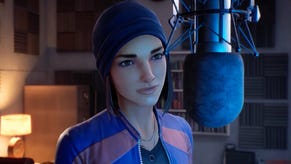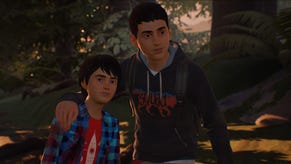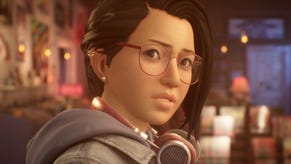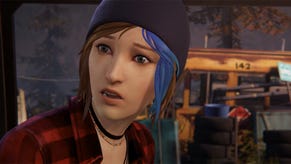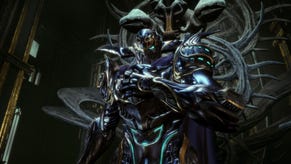The RPS Advent Calendar, Dec 17th: Life Is Strange
2015's best story.
What is the best story of 2015? The RPS Advent Calendar highlights our favourite games from throughout the year, and behind today's door is...
Adam: I could write about the way that Life is Strange managed to validate my love of Telltale's episodic story-driven adventure model, while at the same time surpassing the veteran studio's work in almost every way. The beautiful aesthetic of Arcadia Bay shows the value of an art style and palette that supports the characters and theme of a story, rather than sticking to similar wide-eyed cartoons for every license, and providing areas to explore makes the world that much more convincing than the isolated chambers of recent Telltale efforts.
Dontnod seem so comfortable with the pacing of this particular genre in this particular episodic style that Life is Strange could pass as the culmination of years of releases. That it arrived on the back of Remember Me, an entirely different proposition, gives me hope that the studio will be able to shift gears again when they release their bloodsucking ethical quandary RPG, Vampyr.
I don't want to spend these few paragraphs writing about the quality of the game though - while swatting aside the people who can't deal with its lingo while lapping up Yodaspeak - because I'd rather talk about how much I appreciated its treatment of abuse. The way that the coming of age story collides with catastrophic events, bullying and abuse touches on some of my own experiences with abuse, and how I struggled to distance myself from them.
Note: there are spoilers ahead - they're vague and thematic rather than specifics, but go see what Alice has to say if you don't want to see 'em.
Feeling trapped in an abusive situation, it's common to either withdraw or to try and make the world bigger so that the worst parts of it are barely noticeable; drowned in the noise and action of life. Both of those reactions are in Life Is Strange. Max has retreated to home, Chloe has been trapped there trying to kick down the walls. The time mechanic is both a way of reducing the world by testing its limits and a way of exploding those limits by finding ways around them. But every attempt to rewind, every would have could have should have, is actually a way of pulling the threads tighter rather than unpicking them.
In trying to tie a tourniquet, it's easy to end up with a noose.
I'm not sure that this reading of the game is intentional, and it doesn't fit every part of the game, but Arcadia Bay, at times, seems like a memory of a wound. It's not dark all the way through because the worst parts of youth don't necessarily overshadow every bright spot. But the storm is always there and there are hideous and dangerous people waiting in the wings.
In trying to try to protect those she cares about and Arcadia Bay itself, Max is replaying could haves should haves and would haves, but in the end she an choose to accept that the storm has already passed. The damage is done. Turning the clock back is a way of reliving the pain from different angles, and that may be a necessary part of acceptance, but it's never going to fix what has been done.
And the beautiful thing, in these situations, is the realisation that it's never your job to fix things. What happened is done, and it may have been to do you or to people you wanted to protect, but that doesn't mean you're finished. Far from it. You're ready to begin.
The story of Max, Chloe, Arcadia Bay and everybody else who lives and dies there so often feels like an ending. But when it does come to a close, I was left in no doubt that Max was finally ready to start something new.
Alice: Awkward things, teenagers. They turn up, all weird and half-formed and you don't know what to make of them. Then they say something like "hella" and you squint as you try to figure out if that's something they've started saying because one of The Cool Kids said it. But you see something in them, gangly as they are, and before your eyes they grow into a confident, rounded adult and then oh shit, shit, they have to grow up very quickly, oh shit. Life Is Strange is a bit like that.
After an iffy start, floundering a bit too much like a cheesy Saturday morning teen TV drama, Dontnod Entertainment's episodic time twister found its identity and became one of my favourite games of the year. Like a good teen drama. Chloe and Max's friendship at the heart of the game feels... not quite real, but familiar as the stuff of teenage dreams. The way I might have wished my teens had been. Beautiful sketchy art world filtered through Instagram glow creates a dreamy world where everything revolves around these two friends, which makes it all the more jarring when things twist unexpectedly and 'get real', as I understand the youth say.
Like Pip, I'm not sure what more to say about Life Is Strange. We've certainly chatted a lot about it on RPS over the course of its episodes. I suppose we focused a lot on the central relationships, probably because at times Max and Chloe sometimes weirdly feel like they mirror our own friendship, but its puzzling became pretty satistying at times too. They were never difficult, and at times could be tedious, but its use of time travel felt... good? Satisfying. Pleasing. Which may not sound like high praise, but I've usually no patience at all for adventure game puzzling. Episodic adventures are increasingly skipping puzzles, but Life Is Strange was fun (mostly, ish) in using them to show Max mastering her powers. That can be my next hot take: In Praise Of Mild Puzzles That Are Pretty Okay.
I'm still surprised by the choice many made at the end of it all - not only made, but were convinced was right. It's good to disagree so strongly with them, showing how deeply we were pulled in and how personal it felt. I'll not go too much into The Stuff Wot Unfolds because we've done that plenty already, but, as the immortal bard James Hurley says on what we seek in a journey, "It's not really a place, it's a feeling."
Pip: This is a weird one. It's my Game of the Year but I've started to hate talking about it. I don't think it's a game everyone will love – some won't even like it – and because I loved it I've found myself called to defend it. I don't want to. I just want it to sit in my memory as a thing I loved and that became personally important and to stop needing to share that with other people.
Graham: People were upset when we named Life Is Strange Game of the Month in November but then didn't write anything new about the game. I understand that, and we wished we'd been able to do more, but part of the problem was that we wrote so much about the game over the year as each new episode was released. A lot of people suggested that they missed those articles at the time, so here's a quick list: Pip's episode 1 review; Adam and Pip's episode 2 chat; Quintin's Cogwatch episode on its rewind mechanic; Pip, Adam and Alice's episode 3 verdict; Marsh's Fail Forward on Life Is Strange's dialogue and art style; Pip's episode 4 review; Pip and Alice's spoilery episode 5 verdict; and Pip's overall Life Is Strange review.
Go here for more of our picks for the best PC games of 2015.







